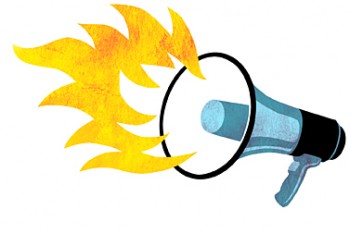Vox bloody populi
25 March 2010 | Columns, Tales of a journalist
How does it sound, the people’s voice? Loud and sometimes clear perhaps, but, as columnist Jyrki Lehtola finds, more often than not shrill and puerile
According to a study carried out by Finland’s biggest newspaper, Helsingin Sanomat, 60 per cent of Finns oppose the idea of allowing more immigrants into Finland.
The chancellor of the University of Helsinki, Ilkka Niiniluoto, is concerned about freedom of speech. Immigration researchers no longer dare participate in public debate, because they find themselves the target of death threats.
A hate group was set up on Facebook, the organising theme of which was the idea that an innocent Finnish pop singer should be killed.
Even now many of us Finns are agitating for fewer rights for homosexuals and lower taxes for ourselves, all the while demanding of our fellow travellers, ‘who the hell do you think you are, are you a retard or what?’
When the internet was only seen as valuable because there was porn on it, the internet didn’t bother us. Unfortunately, pornography has now been superseded by the voice of the people. Our voice.
![]()
All was well when ‘the people’ were out there, somewhere, in their cottages and forests. We were able to idealise and romanticise them. ‘The people’ represented all that was fundamentally and eternally good.
And since, according to Bertolt Brecht’s quoted-to-death definition, Finland is the nation that keeps silent in two languages, we didn’t even have to listen to the people: the people were, after all, mute. We could put our own desires in the mouth of the people and claim they were the people’s desires.
And the people already had a voice, the official voice. The major newspapers had long ago made a decision on principle that letters to the editor penned under pseudonyms would only be published in exceptional circumstances. As a result, docents, researchers, and teachers argued politely about sundry topics on the pages of the letters to the editor section of Helsingin Sanomat, giving rise to an image of a people capable of articulate argumentation.
Then we were given the internet, and everything fell apart.
The people got a voice, and it was not a beautiful voice. It was angry, bitter and prejudiced. It did not have passable command of its own language, nor did it know what to do when the computer’s Caps LoCK KEY WAS INadvertently left on, but that didn’t bother it: it continued spewing hatred at one and all.
And this people knew how to hate. Ensconced behind usernames and aliases, it hated everything external, different and new. And it did not argue, but rather shouted like an anxious teen from behind the bushes that you should be killed, you’re a fag, and at least your dad was a fag.
And it didn’t just talk that way about the big issues like tax policy, immigration policy or homosexual partnership rights. No, it managed to move everything to the same level of debate, whether it be pasta recipes (‘You f *** ing idiot, don’t you realise there are too many carbs in it! You’re sick!’), or car batteries (‘If you come ‘round here asking about car batteries, you must be gay, if you don’t know already!’)
Two interesting results have followed. The first is that it is not our fault, but rather the internet’s.
When the people’s voice is full of hatred, prejudice and resentment, none of us is really man or woman enough to say that something really ought to be done about this people, maybe civilise it a bit. Instead we blame the medium: something should be done about the internet – it made the people like that.
The second consequence is that populism has now won and elitism has lost once and for all.
Since the people’s voice is now audible, it must be listened to. No one has the right to say that the people are prejudiced and wrong. If more than half of the people are prejudiced and wrong, then the politicians, entertainers and business leaders must also be prejudiced and wrong, so the people will accept them.
Democracy is now the idea that more and more opinions and decisions will get their start in Facebook hate groups or internet chat rooms, and that is precisely democracy’s current problem.
Translated by Owen Witesman
1 comment:


25 March 2010 on 11:12 pm
A Finnish friend of mine, asked by me a long time ago if she likes Jyrki Lehtola’s texts, didn’t answer, she laughed instead. ‘So you don’t like him?’ – was my new question. ‘I do, I just usually disagree with him’.
Having read many of Lehtola’s texts, I understand now how right my friend was. And how skilful a writer one should be to wake up the reader’s sympathy and protest at the same time.
I always like, sometimes I even agree.